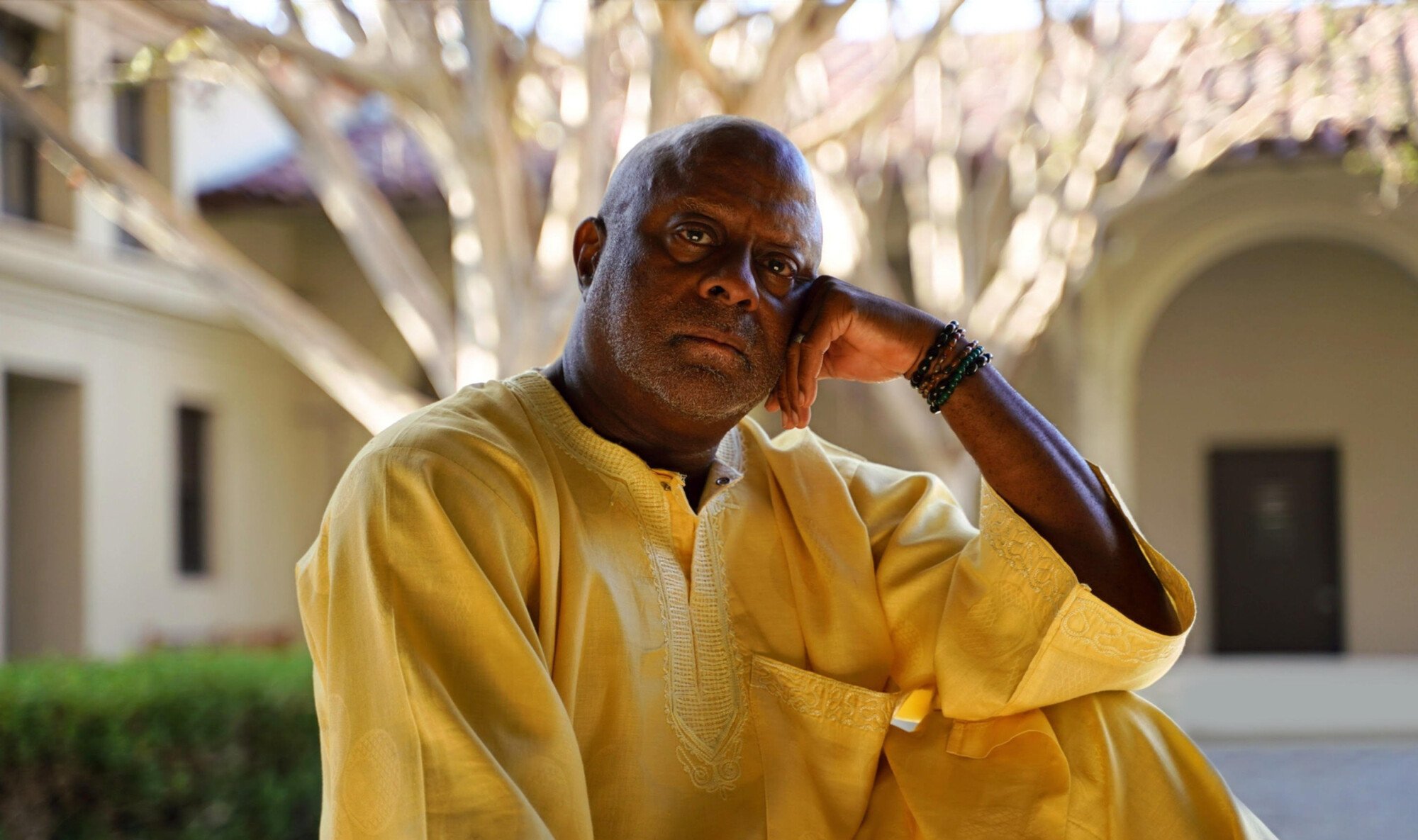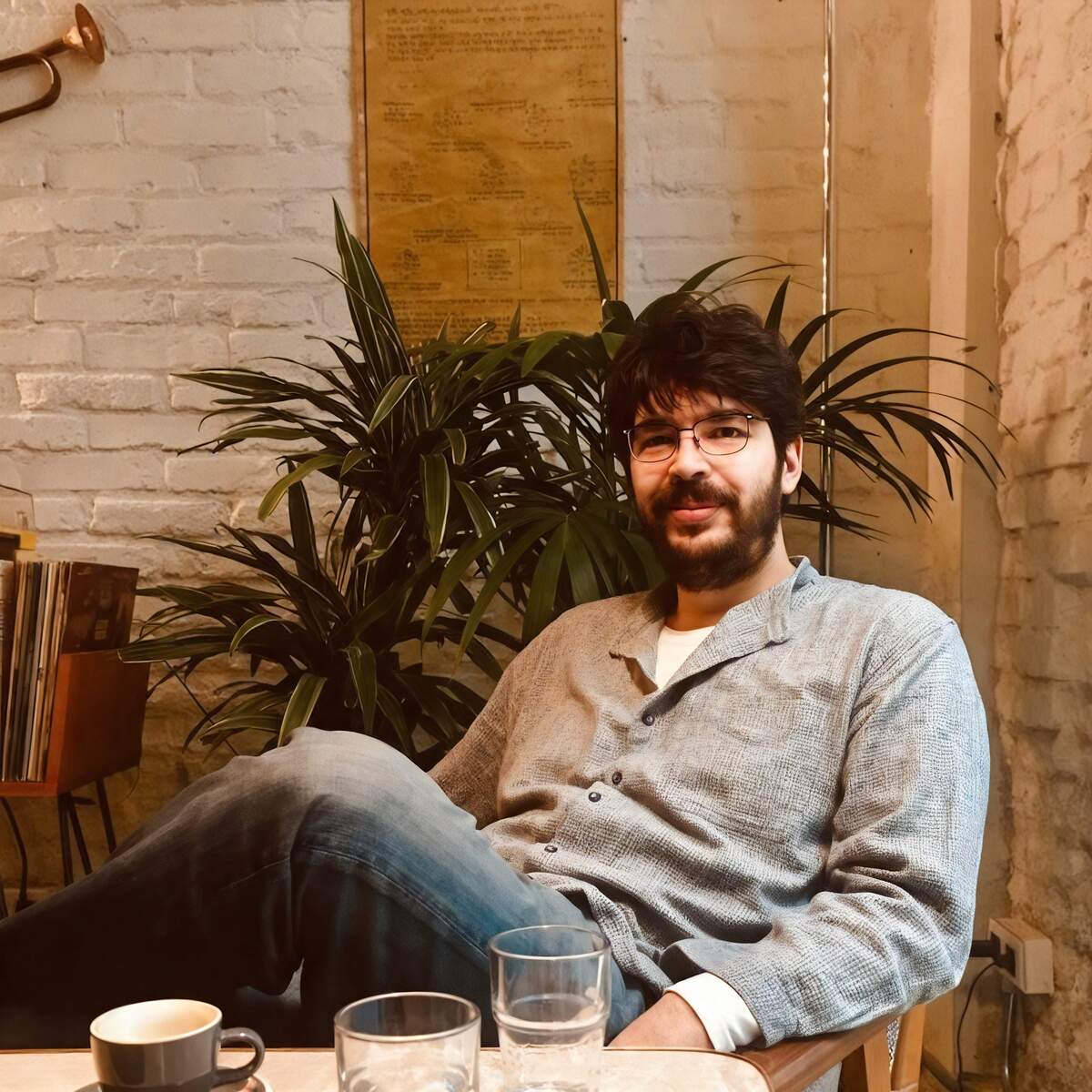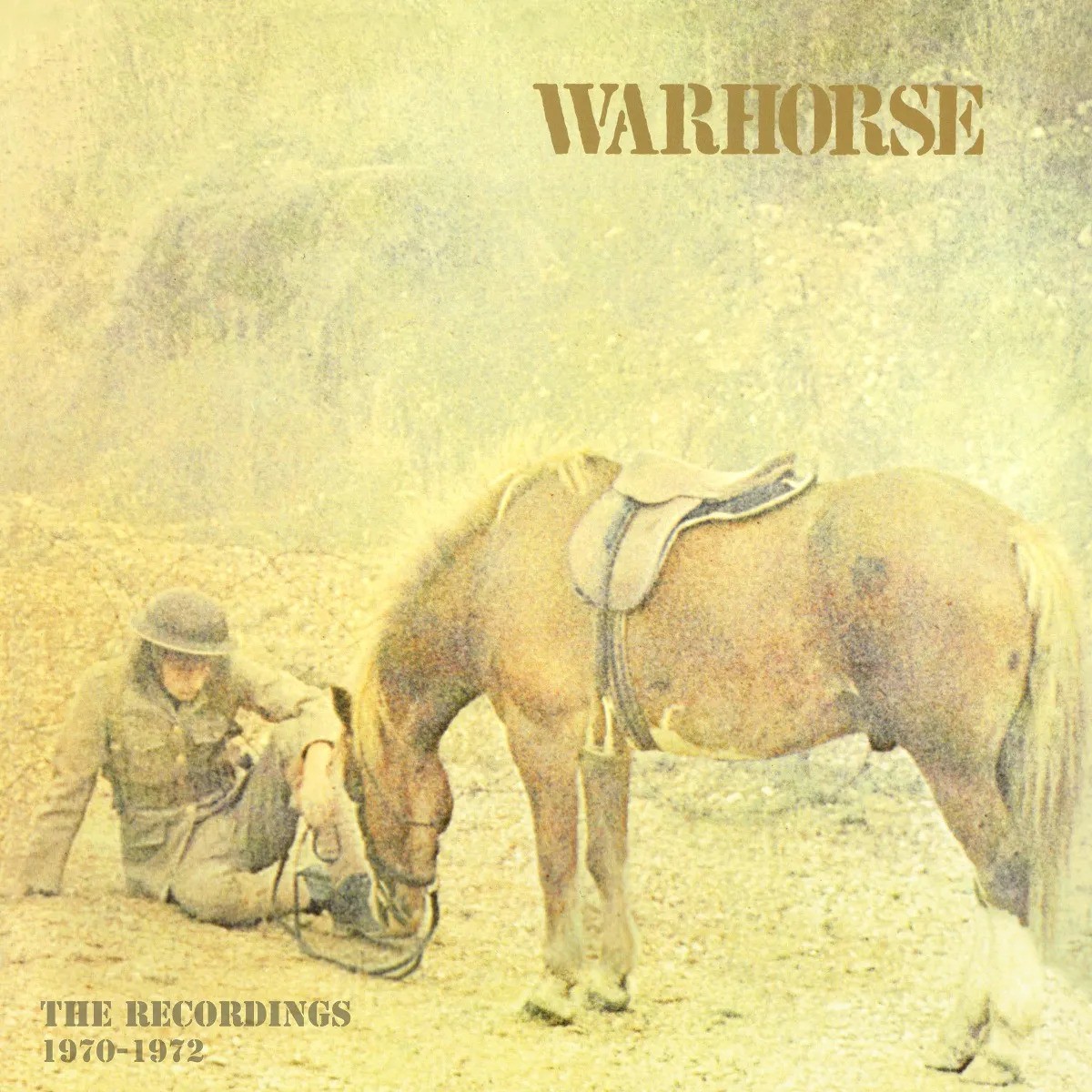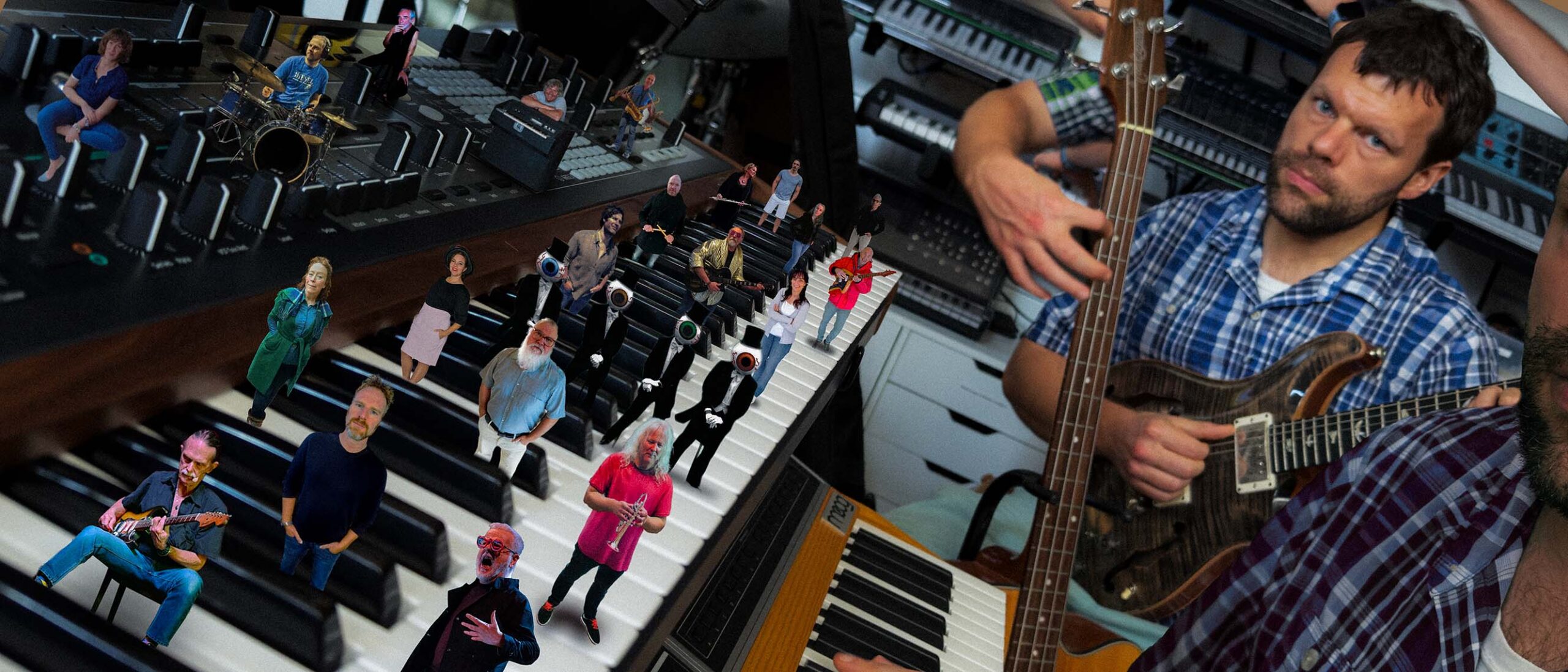Pierre L. Chambers | Interview | New Album, ‘Shining Moments’
Vocalist and poet Pierre L. Chambers began performing nearly 40 years ago and finally recorded a wonderful solo album, ‘Shining Moments’.
He had been thinking about recording an album, and an encounter with Cathy Segal Garcia at a performance was the spark he needed to set the project in motion. Chambers’ debut album is a collection of modern jazz classics in a range of styles, interspersed with a couple of his poems recited to improvised music. His father, bassist Paul Chambers, was one of the most iconic jazz musicians of the 20th century, but it was his mother, Annie Chambers, who instilled in him his love of jazz. Chambers dedicates ‘Shining Moments’ to his parents and the influence they had on his artistry. A pamphlet with three of his poems accompanies the CD package. ‘Shining Moments’ is an auspicious debut for an artist who has been flying under the radar for far too long.
“I dreamed of following in my father’s footsteps by recording something of my own one day”
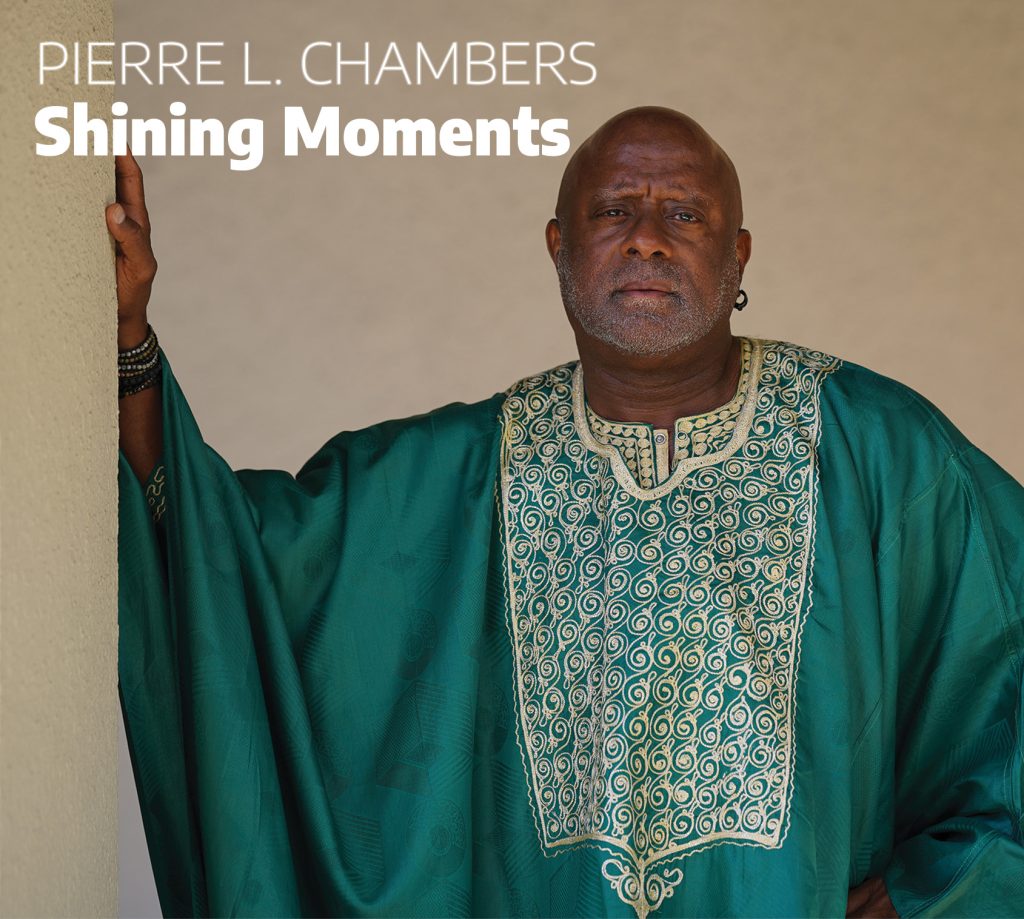
It’s really nice to have your ‘Shining Moments’ just recently released. How long did you work on it and what was the basic concept behind it? Do you think you succeeded and reached your goal?
Pierre L. Chambers: We started working on ‘Shining Moments’ a little over two years ago in late 2020 and then into 2021. I met vocalist, music educator, and producer Cathy Segal-Garcia at a session with Jay Jackson, a Los Angeles actor/promoter. He’d asked me to sing 5 songs on a project he was working on at the late, legendary jazz & blues singer Barbara Morrison’s place in Leimert Park. I sang my set and Cathy came in next. We hadn’t seen one another in a long time. Because of the pandemic, the creative community was wondering how things were going to continue in the music business after everything stopped due to Covid. Cathy and I talked for a moment catching up and she asked me to be a guest on her podcast called Noontime Hang, and of course, I said yes! On the show, Cathy told me she really liked my singing — what I did with a song and my time. She then said she’d like to produce a CD with me. At first, I was, really? I’d been thinking about doing a solo CD for a long time, and now along came Cathy to help me make this dream come true. I was delighted and said, “I’m going to hold you to that!” I’d be crazy not to see this through. That was the start of the project, and two years later, here we are enjoying ‘Shining Moments’.
The basic concept of ‘Shining Moments’ was to sing songs that I love to sing and songs I grew up listening to. I love to sing standards. They are probably my favorite songs to sing. There’s so much emotion and beauty written into a standard. Songs like ‘Sweet Lorraine,’ ‘Long Ago,’ ‘Far Away,’ I Didn’t Know What Time it Was,’ and ‘Autumn Leaves’ are timeless. These are songs you can create magic with. These songs have been with me since childhood, so it seemed right to sing them.
I’m assuming I did reach my goal because ‘Shining Moments’ has been getting such wonderful reviews. When you step into the studio you have ideas of what you want to do. I had such wonderful people to work with, it seemed that as I stepped into their space, I couldn’t do anything but make some magic happen. ‘Shining Moments’ started off being my project, but as time in the studio went by, it morphed into a collaboration of ideas and suggestions and taking chances with old songs. I try to know what I want to do going into the studio. That’s the start of my process — understanding the music to the best of my ability. I’m open to the collaborative process as well. I enjoy others’ input, as long as it’s constructive and I get it. It gives me inspiration to hear others’ opinions or suggestions. You can always build on a suggestion and make it better.
Tell us about your upbringing? How much did your father influence you and in what way the most?
Just like any other little African American young man growing up in America in the 1960’s, it was challenging. There were many things against you as a young African American male and you had to understand those things that were against you. You had to grow up fast and know how to handle yourself in situations. My mother and father separated when I was 5, so I grew up in a single parent household. My mother, Annie Chambers, wasn’t taking any prisoners. My mother provided a safe and comfortable experience in our home. It wasn’t always easy, but she did her best. If you asked a question (as I did much of the time) she gave me the real answer. She was a strong mother who made sure her children did what they were supposed to, to get the best out of this life. She had dreams of what we’d become when we grew up and she tried to make sure we had what we needed to make our dreams come true. We didn’t have what we wanted all the time, but we got by, to quote Al Jarreau.
My mother was the person who told me how important my father was as a musician. She showed us what he’d accomplished by sharing his music with us. I grew up listening to all kinds of music through my mother. She loved all styles of music, especially jazz. You could hear East Indian music, soft rock like the Beatles, James Taylor, rhythm and blues like Johnny Taylor, Aretha, Gladys Knight, and Bobby Womack. And of course, she played jazz. You could hear Miles, Coltrane, Bud Powell, Benny Golson. Hank Mobley, Dexter Gordon, Wynton Kelly, and the list goes on and on coming from her room.
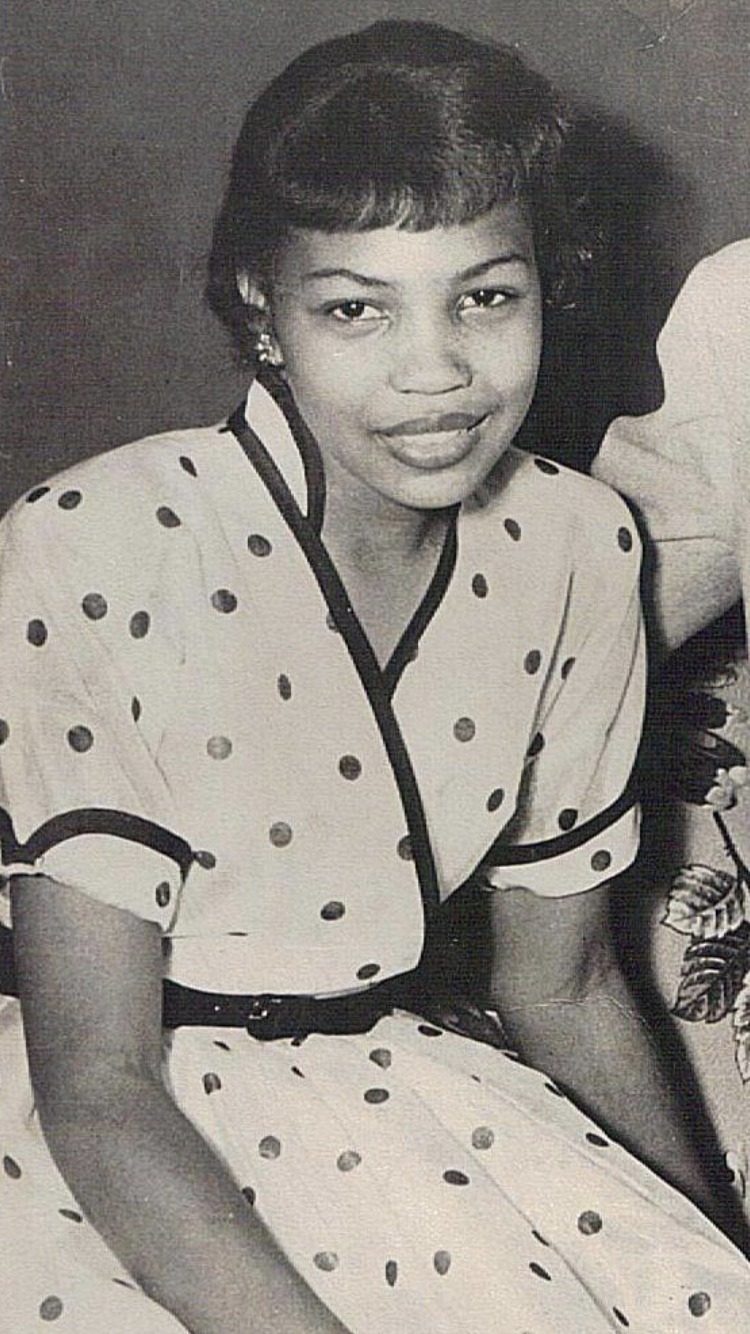
My father’s music influences me all the time. The beauty of his chord choices, the way he plays the bow, that solid, consistent sound that all the bass players I meet tell me is uniquely his. I listen to him on the records he played with Miles Davis and still to this day I hear new things. He was an amazing bass player. He only wrote 8 songs to my knowledge, and I am trying to write lyrics to most of them. I sang ‘Dear Ann’ on the CD, which is my father’s song that he wrote for my mother. A dear friend and piano player I work with from time-to-time, Jon Gilutin, said to me, “your father was bad ass” reading the sheet music for ‘Dear Ann’ as we rehearsed. I can’t tell you exactly what he said, but the way my father wrote the bridge section of ‘Dear Ann’ was challenging and different. I remember feeling wonderful about his statement, not that I didn’t already know that. I grew up listening to my father’s music knowing that he was amazing. My father’s music influences the way I think about music and how I hear music and what I do with a song. I try to scat with him in mind. I like to use plucking sounds sometimes when I scat. I always think about the bass when I scat. I worked on my father’s discography during the time I was living in New Jersey. I worked down the street from Rutgers University and had the pleasure of meeting and working with Dan Morgenstern at the Institute of Jazz Studies. He was very kind to me, allowing me to access the library of music at the institute. I was allowed to ask questions and sit for hours working on my father’s discography. I didn’t know as much as I thought regarding who my father played with and how many records he made. I found these single albums my father played on with great musicians – like John Jenkins, Sahib Shahab, A.K. Salim, Wayne Shorter, Frank Strozier, Warne Marsh. I had no idea he played with these people. It was a wonderful exploration of his music. During that time, I’d call my mother and ask her why she hadn’t told me about these albums. She told me that I had to discover that for myself. I decided to find those single pieces of my father’s music. I’ve found quite a few recordings, but still have a long way to go. In his 16-year career, my father appeared on almost 300 records, traveled in the States and around the world playing live music. Not to mention who he worked with — Miles Davis, John Coltrane, Cannonball Adderley, Curtis Fuller, Hank Mobley, Horace Silver, Dexter Gordon, Joe Henderson, Les McCann, et cetera.
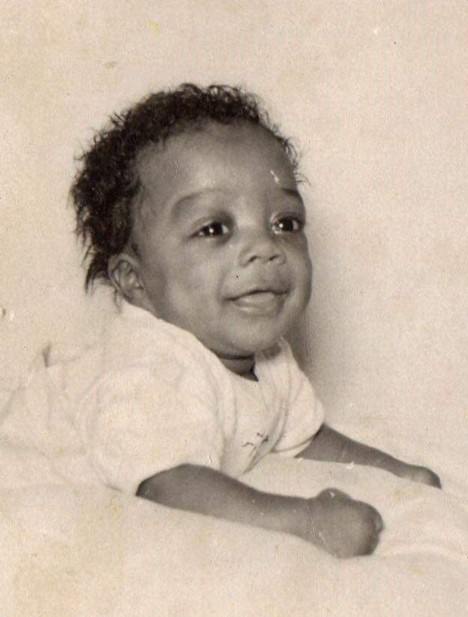
“Being able to say I heard ‘Kind of Blue’ the first time it was played”
Tell us how you would describe the scene back then… There was a lot happening in the music world.
As I understand it from people I’ve met along the way, it was an exciting, creative time. I’ve had the pleasure of knowing many of the women of Jazz — wives of the musicians. Of course, my mother Annie Chambers; Ajabu Humphries, Lex Humphries’ wife; Naima Coltrane, John Coltrane’s wife; Stella Timmons, Bobby Timmons’ wife; Jeanne King, Jimmy Bond’s ex-wife. They’ve taken the time to speak with me about the music and what was happening during that time. My mother would say we’d (her gang) would go from club to club listening to the music and get in free because they were the wives of these great men. Imagine being 16-20, having access to the greatest music in the world from a close range. Being able to say I heard ‘Kind of Blue’ the first time it was played. I was in the studio while Lee Morgan played. I heard John Coltrane play ‘Giant Steps’. My mother told me about having a discussion with Miles Davis about guitars and telling him he had a hole in his sweater before he took a picture. To my mother they were precious memories. I remember the first time I saw and heard my father play on stage. I was about 5 or 6. He was playing with Miles Davis at the Drone in Detroit. Onstage was Miles, Coltrane, Cannonball, Wynton, Jimmy, and my daddy. I remember watching him play and listening to the music they were playing. These were friends of my mother and father. It was wonderful watching my daddy play and the music was great. I can still remember that to this day.
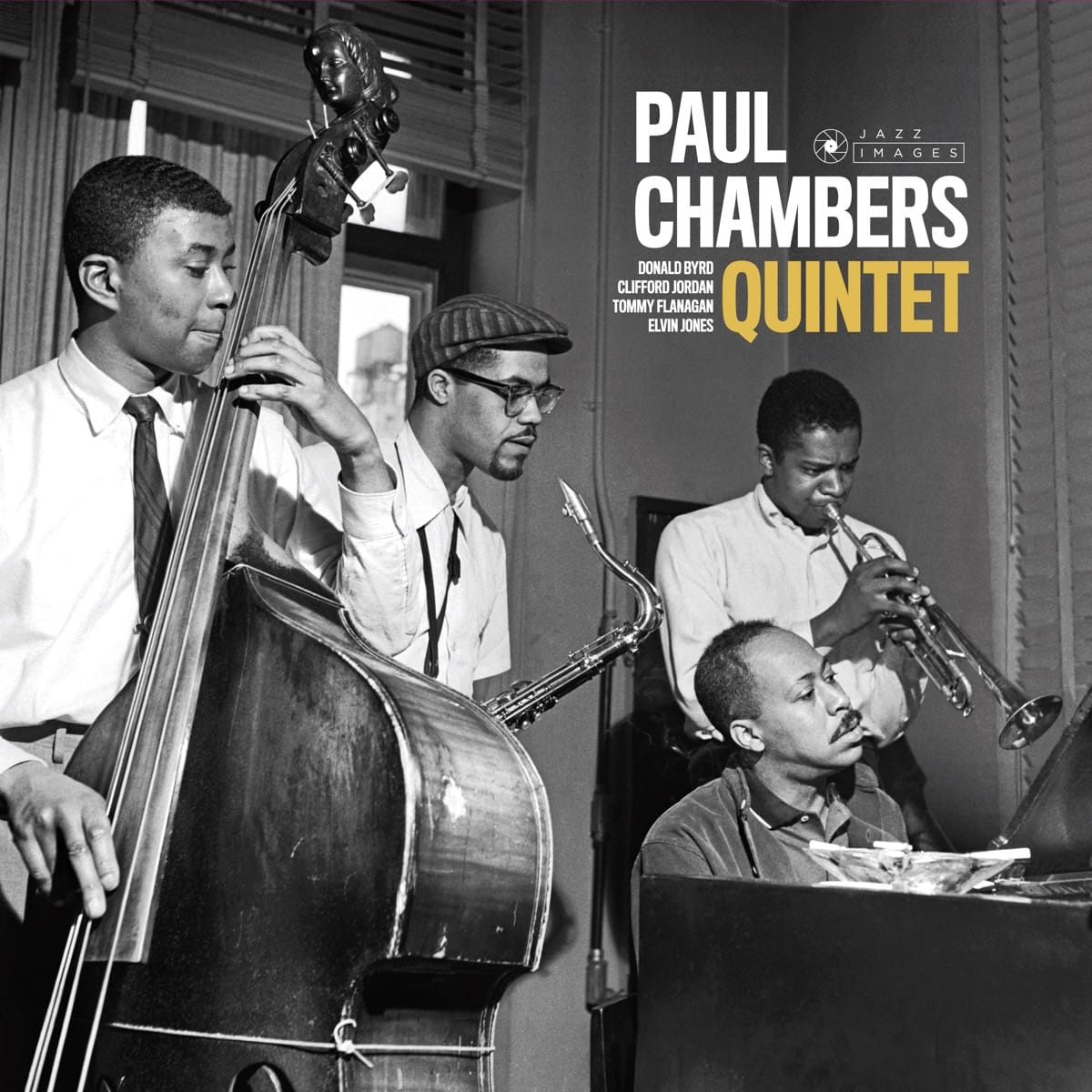
You have been performing for nearly four decades now, what made you decide to release a solo album now?
I sang with a few groups before I decided to do solo work. When I moved to Los Angeles, I started out doing more solo work with an L.A. promoter, Dolores Peterson. She introduced me to Lisa Herbert and Mitch Ellis and together we formed a group named Chambers, Herbert & Ellis and sang the music of Lambert, Hendricks and Ross. We sang that music for 8 – 10 years together learning these tough songs and doing quite well, I might add. We always talked about doing solo work. As a child of a jazz musician, I dreamed of following in my father’s footsteps by recording something of my own one day. It seemed like a glamorous life being in the studio. It was a lot of fun, but it was also hard work, and I was exhausted by the end of each session. Music is both mental and physical. You’re using both your body and mind to create something. The physical to me is just the doing but the mental — trying to remember notes, the way you want to sing the song, timing, listening to all the musicians, incorporating what they are doing into your singing, counting, watching, being in the present moment for 5 to 6 hours or more. I loved it, but it was terrifying, all at the same time.
Tell us about Cathy Segal Garcia?
Cathy Segal Garcia is larger than life. She is a force of nature and one of the mentors within the jazz community in L.A. and the world. She has a big heart and is willing to give so much to see someone’s dream come true. She was both a mentor and supporter. She both led and carried the team during this time. She delights in making quality music. She loves stepping into the producer’s shoes to make magic happen. We had several conversations about that side of the music business. She knows how much I hate that side of the music business, and I was glad she was there to do her thing. She’s my dream maker and I love her for making this dream of mine come true. I was/am in good hands working with Cathy, as have all the people she’s worked with in this capacity.
Tell us about the personnel on the album. How did you get them together? What was the energy in the studio
The personnel on ‘Shining Moments’ are my shero’s and hero’s. Everybody who worked on ‘Shining Moments’ I will love forever. Cathy picked most of the personnel, and I have to say, she has wonderful taste joining singers to musicians.
Karen Hammack – I’d met Karen through a friend, the vocalist Tierney Sutton. I didn’t know much about her music — I just knew she was an amazing piano player after hearing her play at Tierney’s house one night. Cathy said Karen is a singer’s piano player, and she wasn’t wrong about that. Karen took the music and made it even more wonderful. She kept saying to me throughout the session that she wanted to make me sound good, and I have to say she accomplished that goal. Karen’s choice of chords and intuitive phrasing put soul into the music. She played the music on my mother’s poem “This Mother.” We selected ‘Peace’ as the music for the poem. Before we decided to use Peace as the background music Karen played something she called ‘Americana,’ which was sensitive, beautiful and emotional. I started to recite the poem and all of a sudden, I burst into tears. Music has that ability to bring you to those emotions you’ve put away for survival. This poem was about my mother whom I lost in 2014. It never gets easy missing your mother. She brought those emotions out with that piece of music at that moment. I had to pull myself together to finish. She’s that kind of musician, and I was so happy to have her on board.
Henry (Skipper) Franklin – another one of Cathy’s choice picks. I knew the minute I met Henry we were going to be friends. We hit it off right away. He has a wonderful sense of humor, and we laughed all through the sessions. He told me how much he loved my father and how much he’d influenced him on bass. I love hearing that from bass players. That line never gets tired. His selections were perfect for me. His sound is big and fat and lovely. He is an amazing bass player, and how lucky am I to have met him and have him on my CD. He was the sound with my poem to my father “The Bass.” He started playing ‘So What’ at the perfect time on that piece, which made me laugh out loud. Wonderful person and bass player.
Clayton Cameron – I knew Clayton Cameron as a result of him playing for Chambers, Herbert & Ellis, and yes, we all thought he played his ass off! So, when I needed another drummer for the session, I asked Cathy to call Clayton Cameron to see if he was available. Fortunately for me he said yes. I was surprised. I didn’t think he remembered me from CHE, so I wasn’t expecting him to be available. He did an amazing job bringing the energy to this project. His ability to swing, fill in space and charge the group forward was apparent from the first song we did, which was ‘Work Song’. When I finished singing, I looked at Cathy and she gave the thumbs up — we both just laughed out loud. We found the right drummer for the project.
Jeff Kaye – Jeff is a friend of guitarist Dori Amarilio, and if he comes with Dori’s approval then all is well. Jeff has a beautiful tone that just brings such beauty to a project. I was so happy that he said yes once I heard him play. He has so much emotion in his playing and he’s a nice guy. I enjoyed watching him make magic as well as talking to him after. His contribution to ‘Lonely Girl’ is just stellar. He liked my singing on ‘Lonely Girl’ and knew what to do to fill in the spaces. I love the sound of the flugelhorn, so it made sense to use this instrument with this piece, and Jeff was the right choice. What a wonderful person as well as a musician.
Dori Amarilio – Dori was another musician I knew from the Chambers, Herbert & Ellis days. We went to his studio in Studio City, and he put a new spin on some of the music we wanted to perform. Dori is the guy to go to if you want Ideas. As well as owning a studio, he’s a composer, guitarist, engineer, and just all-around creative person. The song I wanted to get a new spin for was ‘Dear Ann,’ the song my father wrote for my mother. He suggested we do it to a bossa beat which I thought was interesting. Chambers, Herbert & Ellis used his idea at a show that my mother attended, and she liked the new treatment. I added it to the list of songs I wanted to use on “Shining Moments” as a tribute to both my mother and father. My father wrote the song for my mother, and I wrote the lyrics. Clayton brought the energy and Dori added some wonderful guitar work in the Wes Montgomery vein.
Cathy Segal Garcia – I already told you how much I love Cathy. Her background vocals on ‘Afro Blue’ provided just the right touch that the song needed. I wanted it to be earthy and soulful, and her vocals added an ethereal touch. I love singing this song. It’s the only Christmas song for me and I love the Coltrane version and of course how Betty Carter sings the song. I enjoy the movement Coltrane gives the song and the joy in his notes are wonderful.
Matt Gordy – Matt wrote most of the arrangement to ‘Shining Moments’. We discussed how I wanted the music to sound and the feel I wanted to capture, and Matt wrote amazing arrangements. He’s a great guy and a wonderful drummer.
All these great musicians were kind enough to give their time and talent to this newcomer. How lucky am I to have them come play and help create this CD I’m so proud of. It was a joy working with these musicians and I will hold them in my heart forever.
Can you share some further words about the writing, recording and producing process?
This being my first time working in the studio and my first solo CD, I have little to say on the matter. I can tell you this — it was hard work, and I loved every minute of being in the studio. I enjoyed the process of making music. One of my dreams was to get a feel of what it was like for my father going into the studio making music. I walked into the studio with a lot of ideas — how I wanted to sing the songs, how I wanted it to sound, what I wanted to create, and I have to say I am pleased with what we made. I think my father and mother would be pleased as well. Someone said that to me when they heard ‘Shining Moments’ — that was the best compliment I could receive. The one thing that’s essential to me is to have fun and feel good around everyone I work with. If we can be happy together, we can create good music. I’ve worked in groups that were not fun and I didn’t like it, so I enjoy having the mood in the studio fun and easy — there’s no need to make it any other way.
How do you usually approach music making?
Carefully, and with much respect for the creator and the music. I try to honor the music by knowing the song before I go into the studio. Then, and only then, can you interpret it differently with respect. I don’t read music well so I’m big on practice and rehearsal. If I can get in 2 to 3 rehearsals, I can understand what the musicians are doing with a song and learn it in different ways — that’s very important to me.
Are you planning to play some shows in the near future?
Now that I have a product that represents me, I’m hopeful that I’ll get more bookings both in L.A. and outside of California. I love singing live. I love the tension that comes before you sing. I love hitting the first note right and the rest comes. Being able to make magic on stage is fun and a great feeling, and sometimes it’s terrifying as well!
Is “Shining Moments” actually a tribute to your parents and their love and creativity that inspired you?
It started off being just something I always wanted to do, but as we got into it, I realized it made sense to give this project to my parents. They are the reason I love jazz. They’re the reason I listen to jazz and feel its rhythms. Without their input in my life, I wouldn’t be able to do what I do.
Do you have any other active projects going on at this point? Will you continue to record new albums?
The next stage of bringing ‘Shining Moments’ to the world will be to raise funding to put it on the radio. That’s the next part of this process. I have written a book of poetry that I want to get published, and after ‘Shining Moments,’ I’m going to concentrate on finishing it. I’ve also written lyrics to more of my father’s music and plan to continue doing that in the near future. I’d like to work on another CD in about 2 years. I’ve already started picking songs I want to sing. This was both rewarding and hard, so I figure putting a couple of years between projects will give me time to regroup, learn the music, figure out how I’m going to pay for it and make it happen.
What are some of the most important players that influenced your own style and what in particular did they employ in their playing that you liked?
Of course, I listen to all the masters that played with my father. Coltrane, Miles, Bud Powell, Hank Mobley, Lee Morgan, Curtis Fuller, Wynton Kelly, Jimmy Cobbs, Bill Evans, Philly Joe Jones, and so many others. Singers are plentiful — Jon Hendricks, Billie Holiday, Joe Williams, Carmen McRae, Johnny Hartman, Ella Fitzgerald, King Pleasure, Betty Carter, Eddie Jefferson, Abbey Lincoln, Al Hibbler, Etta Jones, Jack Jones, Sarah Vaughn, Kurt Elling, Gloria Lynn, Gregory Porter, Dianne Reeves, Rochelle Farrell, Carmen Lundy, Angelique Kidjo, Mariam Makeba. Oumou Sangare and so many more. They share a love of the music and give their souls to the music — something I’m reaching for as I continue doing this. They share knowledge of how to sing a song with every note. You can listen to their soul in their voice. You get the love they feel while they are singing. They make you feel good. Make you want to get up and dance, tap your foot to the groove they are laying down. They spill into your soul their wisdom and grace. It’s wonderful what they do. It’s so beautiful how they give themselves through their music.
Have you found something new lately you would like to recommend to our readers?
Gregory Porter and Kurt Elling are gurus, and they are making magic happen. Anything they produce is worthy. New people I’ve discovered over the last few years are Christian Sands, Esperanza Spaulding, Robert Glasper, Jazzmeia Horn, Cecile McLorin Salvant, Sullivan Fortner. Some people who are not new but whom I love are Tierney Sutton, Sarah Gazarek, Tadataka Unno, Christian aTunde Adjuah, and a few more.
Thank you for your time. Last word is yours.
Thank you so much for giving me this opportunity and for enjoying my work. My message to your readers is go out and hear some live music. It makes the soul sing and calms the spirit. It helps you sleep at night.
Klemen Breznikar
Pierre L. Chambers Official Website / Facebook

